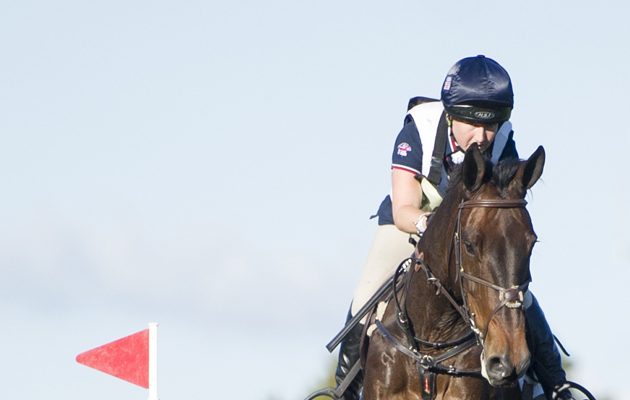The recent BBC Elite British Sportswomen survey highlighted challenges and areas of concern for female athletes as they juggle their personal health and plans to start a family with their career. H&H spoke to top British-based riders from the Olympic disciplines, as well as experts from racing and British Equestrian, to find out how horse sport in the UK shapes up...
Equestrian sports have the opportunity to lead on discussing taboo topics, it is thought, as elite female athletes’ concerns over starting families and personal health have been highlighted in a study.
The BBC Elite British Sportswomen survey covered topics including whether sportswomen felt supported by governing bodies to have a baby and continue to compete, if they had delayed starting a family because of their career, whether their performance had been affected by their period, and if they felt comfortable discussing their period with coaches.
The survey included responses from a range of sports including racing, but no responses were received from equestrianism, so H&H decided to canvas opinion from some top British-based riders.
{"content":"PHA+T2x5bXBpYyBnb2xkIG1lZGFsLXdpbm5pbmcgZHJlc3NhZ2UgcmlkZXIgYW5kIG1vdGhlciBvZiB0aHJlZSA8YSBocmVmPSIvdGFnL2xhdXJhdG9tbGluc29uIj5MYXVyYSBUb21saW5zb248L2E+LCAzNSwgdG9sZCA8ZW0+SCZhbXA7SDwvZW0+IGNvbmNlcm5zIGFyb3VuZCB0YWtpbmcgYSBicmVhayBmcm9tIGNvbXBldGluZyB0byBoYXZlIGEgYmFieSBhcmUgcHJlc2VudCBpbiBlcXVlc3RyaWFuaXNtIOKAnG1vcmUgdGhhbiBtb3N0IHNwb3J0cy7igJ08L3A+CjxwPuKAnEluIHNvbWUgc3BvcnRzIHBlb3BsZSBtaWdodCBjb21wZXRlIHdoZW4gdGhleeKAmXJlIHlvdW5nZXIgdGhhbiBhbiBhZ2Ugd2hlcmUgdGhleSBtYXkgd2FudCB0byBiZSBoYXZpbmcgY2hpbGRyZW4sIHdoZXJlYXMgaW4gb3VyIHNwb3J0IGJlY2F1c2Ugb2YgdGhlIGxvbmdldml0eSwgaXQgZG9lcyBvdmVybGFwLiBJZiB5b3XigJlyZSBhIHdvbWFuIHdobyB3YW50cyB0byBoYXZlIGNoaWxkcmVuLCBpdCB3b3VsZCBzdGlsbCBwcm9iYWJseSBiZSB3ZWxsIHdpdGhpbiB5b3VyIGNhcmVlciB0aW1lLOKAnSBzaGUgc2FpZC48L3A+CjxwPjxkaXYgY2xhc3M9ImFkLWNvbnRhaW5lciBhZC1jb250YWluZXItLW1vYmlsZSI+PGRpdiBpZD0icG9zdC1pbmxpbmUtMiIgY2xhc3M9ImlwYy1hZHZlcnQiPjwvZGl2PjwvZGl2PjxzZWN0aW9uIGlkPSJlbWJlZF9jb2RlLTMxIiBjbGFzcz0iaGlkZGVuLW1kIGhpZGRlbi1sZyBzLWNvbnRhaW5lciBzdGlja3ktYW5jaG9yIGhpZGUtd2lkZ2V0LXRpdGxlIHdpZGdldF9lbWJlZF9jb2RlIHByZW1pdW1faW5saW5lXzIiPjxzZWN0aW9uIGNsYXNzPSJzLWNvbnRhaW5lciBsaXN0aW5nLS1zaW5nbGUgbGlzdGluZy0tc2luZ2xlLXNoYXJldGhyb3VnaCBpbWFnZS1hc3BlY3QtbGFuZHNjYXBlIGRlZmF1bHQgc2hhcmV0aHJvdWdoLWFkIHNoYXJldGhyb3VnaC1hZC1oaWRkZW4iPg0KICA8ZGl2IGNsYXNzPSJzLWNvbnRhaW5lcl9faW5uZXIiPg0KICAgIDx1bD4NCiAgICAgIDxsaSBpZD0ibmF0aXZlLWNvbnRlbnQtbW9iaWxlIiBjbGFzcz0ibGlzdGluZy1pdGVtIj4NCiAgICAgIDwvbGk+DQogICAgPC91bD4NCiAgPC9kaXY+DQo8L3NlY3Rpb24+PC9zZWN0aW9uPjwvcD4KPHA+4oCcV2hlbiBJIHdhcyBwcmVnbmFudCB3aXRoIG15IGZpcnN0IGNoaWxkIGluIDIwMTQsIG15IHRvcCBob3JzZSBoYWQgcmV0aXJlZCBhbmQgSSBkaWRu4oCZdCBoYXZlIGFub3RoZXIgYXQgdGhlIHNhbWUgbGV2ZWwgeWV0IHNvIEkgaGFkIGEgZGlmZmVyZW50IHByZXNzdXJlIGJlY2F1c2UgSSB3YXMgY29taW5nIGJhY2sgZnJvbSBwcmVnbmFuY3kgYW5kIHRyeWluZyB0byBmaW5kIHRoZSBuZXh0IGhvcnNlIHRvIGNvbWUgYmFjayB0byB0aGF0IGxldmVsLuKAnTwvcD4KPHA+TGF1cmEgYWRkZWQgdGhhdCBkcmVzc2FnZSBpcyBnZXR0aW5nIGJldHRlciBhdCBzdXBwb3J0aW5nIHdvbWVuIG93aW5nIHRvIHRoZSBGRUnigJlzIGZyZWV6aW5nIG9mIHdvcmxkIHJhbmtpbmcgcG9pbnRzIHdoaWxlIHJpZGVycyB0YWtlIHRpbWUgb3V0IHRvIGhhdmUgYSBiYWJ5LCBidXQgc2FpZCB0aGVyZSBhcmUgbWFueSB2YXJpYWJsZXMgaW4gcmV0dXJuaW5nIHRvIHRvcCBsZXZlbC48L3A+CjxwPuKAnFRpbWUgZG9lc27igJl0IHN0YW5kIHN0aWxsIOKAkyB0aGluZ3MgY2Fycnkgb24gd2hlbiB5b3XigJlyZSBvdXQgb2YgYWN0aW9uLiBZb3UgbWlnaHQgYmVjb21lIGxlc3MgcmVsZXZhbnQgYW5kIG90aGVyIGNvbWJpbmF0aW9ucyB3aWxsIGhhdmUga2VwdCBjb21wZXRpbmcgYW5kIGltcHJvdmVkLiBJdOKAmXMgaGFyZCBmb3IgZ292ZXJuaW5nIGJvZGllcyB0byBjYXRlciBmb3IgdGhhdCBpbiBhIHNlbnNlIGJlY2F1c2UgeW91IGNhbuKAmXQgaGluZGVyIHBlb3BsZSB3aG8gYXJlIGNhcnJ5aW5nIG9uIGFuZCBkb2luZyB3ZWxsLOKAnSBzaGUgc2FpZC48L3A+CjxkaXYgY2xhc3M9ImFkLWNvbnRhaW5lciBhZC1jb250YWluZXItLW1vYmlsZSI+PGRpdiBpZD0icG9zdC1pbmxpbmUtMyIgY2xhc3M9ImlwYy1hZHZlcnQiPjwvZGl2PjwvZGl2Pgo8cD7igJxJdOKAmXMgYmVjb21pbmcgbW9yZSB0YWxrZWQgYWJvdXQgYnV0IGl04oCZcyBub3QgYXMgc2ltcGxlIGFzIG1hdGVybml0eSBsZWF2ZSBhdCBhIG5pbmUtdG8tZml2ZSBqb2Igd2hlcmUgdGhleSBoYXZlIHRvIGdpdmUgeW91IHRoZSBqb2IgYmFjay7igJ08L3A+CjxwPktpd2kgZXZlbnRlciA8YSBocmVmPSIvdGFnL2pvbmVsbGUtcHJpY2UiPkpvbmVsbGUgUHJpY2U8L2E+LCB3aG8gd29uIEJhZG1pbnRvbiBpbiAyMDE4IG5pbmUgbW9udGhzIGFmdGVyIGdpdmluZyBiaXJ0aCwgdG9sZCA8ZW0+SCZhbXA7SDwvZW0+IHNoZSBkZWxheWVkIHN0YXJ0aW5nIGEgZmFtaWx5IG93aW5nIHRvIGhlciBjYXJlZXIuPC9wPgo8ZGl2IGNsYXNzPSJhZC1jb250YWluZXIgYWQtY29udGFpbmVyLS1tb2JpbGUiPjxkaXYgaWQ9InBvc3QtaW5saW5lLTQiIGNsYXNzPSJpcGMtYWR2ZXJ0Ij48L2Rpdj48L2Rpdj4KPHA+4oCcQWZ0ZXIgTG9uZG9uIDIwMTIgSSB3YXMgMzIgYW5kIGl0IHByb2JhYmx5IHdvdWxkIGhhdmUgYmVlbiB0aGUgYXBwcm9wcmlhdGUgdGltZSBidXQgSSBoYWQganVzdCBnb3QgYSBiaXQgb2YgbW9tZW50dW0gYW5kIHRoYXQgd2FzIHRoZSBsYXN0IHRoaW5nIG9uIG15IG1pbmQgc28gd2UgZGVsYXllZCBpdCB1bnRpbCBhZnRlciBSaW8gMjAxNizigJ0gc2hlIHNhaWQuPC9wPgo8cD5Kb25lbGxlIGFkZGVkIHNoZSBiZWxpZXZlcyB3b21lbiBzaG91bGQgYmUgYWJsZSB0byByYWlzZSBjb25jZXJucyBhcm91bmQgc3RhcnRpbmcgYSBmYW1pbHkgaWYgdGhleSB3YW50IHRvLjwvcD4KPGRpdiBjbGFzcz0iYWQtY29udGFpbmVyIGFkLWNvbnRhaW5lci0tbW9iaWxlIj48ZGl2IGlkPSJwb3N0LWlubGluZS01IiBjbGFzcz0iaXBjLWFkdmVydCI+PC9kaXY+PC9kaXY+CjxwPuKAnE9mdGVuIHdvbWVuIGRvbuKAmXQgYmVjYXVzZSBpdOKAmXMgbm90IGFsd2F5cyBlYXN5IHRvIHRhbGssIGV2ZXJ5b25lIGhhcyBkaWZmZXJlbnQgYWJpbGl0aWVzIHRvIGdldCBwcmVnbmFudCBzbyBpdOKAmXMgYSBzZW5zaXRpdmUgc3ViamVjdCBidXQgSSBkb27igJl0IHRoaW5rIHRoZXJlIHNob3VsZCBiZSBhbnkgcmVhc29uIG5vdCBmb3IgaXQgdG8gYmUgc3Bva2VuIGFib3V0IHB1YmxpY2x5IGlmIHBlb3BsZSBhcmUgaGFwcHkgdG8s4oCdIHNoZSBzYWlkLjwvcD4KPHA+PGltZyBmZXRjaHByaW9yaXR5PSJoaWdoIiBkZWNvZGluZz0iYXN5bmMiIGNsYXNzPSJsYXp5bG9hZCBibHVyLXVwIGFsaWdubm9uZSBzaXplLWZ1bGwgd3AtaW1hZ2UtNjcwMTM1IiBkYXRhLXByb2Nlc3NlZCBzcmM9Imh0dHBzOi8va2V5YXNzZXRzLnRpbWVpbmN1ay5uZXQvaW5zcGlyZXdwL2xpdmUvd3AtY29udGVudC91cGxvYWRzL3NpdGVzLzE0LzIwMTcvMDMvbmV3LWhoLXBsYWNlaG9sZGVyLTIwMHgyMDAucG5nIiBkYXRhLXNyYz0iaHR0cHM6Ly9rZXlhc3NldHMudGltZWluY3VrLm5ldC9pbnNwaXJld3AvbGl2ZS93cC1jb250ZW50L3VwbG9hZHMvc2l0ZXMvMTQvMjAxOC8xMS9Ib2xseS1TbWl0aC1hbmQtUXVhbGl0eS1PbGQtSm9rZS5qcGciIGFsdD0iSG9sbHktU21pdGgtYW5kLVF1YWxpdHktT2xkLUpva2UiIHdpZHRoPSI2NDAiIGhlaWdodD0iNDAwIiBkYXRhLXNpemVzPSJhdXRvIiBkYXRhLXNyY3NldD0iaHR0cHM6Ly9rZXlhc3NldHMudGltZWluY3VrLm5ldC9pbnNwaXJld3AvbGl2ZS93cC1jb250ZW50L3VwbG9hZHMvc2l0ZXMvMTQvMjAxOC8xMS9Ib2xseS1TbWl0aC1hbmQtUXVhbGl0eS1PbGQtSm9rZS5qcGcgNjQwdywgaHR0cHM6Ly9rZXlhc3NldHMudGltZWluY3VrLm5ldC9pbnNwaXJld3AvbGl2ZS93cC1jb250ZW50L3VwbG9hZHMvc2l0ZXMvMTQvMjAxOC8xMS9Ib2xseS1TbWl0aC1hbmQtUXVhbGl0eS1PbGQtSm9rZS0xMzV4ODQuanBnIDEzNXcsIGh0dHBzOi8va2V5YXNzZXRzLnRpbWVpbmN1ay5uZXQvaW5zcGlyZXdwL2xpdmUvd3AtY29udGVudC91cGxvYWRzL3NpdGVzLzE0LzIwMTgvMTEvSG9sbHktU21pdGgtYW5kLVF1YWxpdHktT2xkLUpva2UtMzAweDE4OC5qcGcgMzAwdywgaHR0cHM6Ly9rZXlhc3NldHMudGltZWluY3VrLm5ldC9pbnNwaXJld3AvbGl2ZS93cC1jb250ZW50L3VwbG9hZHMvc2l0ZXMvMTQvMjAxOC8xMS9Ib2xseS1TbWl0aC1hbmQtUXVhbGl0eS1PbGQtSm9rZS02MzB4Mzk0LmpwZyA2MzB3IiBzaXplcz0iKG1heC13aWR0aDogNjQwcHgpIDEwMHZ3LCA2NDBweCIgLz48L3A+CjxwPkV1cm9wZWFuIHRlYW0gYnJvbnplIG1lZGFsbGlzdCA8YSBocmVmPSIvdGFnL2hvbGx5LXNtaXRoIj5Ib2xseSBTbWl0aDwvYT4sIDMxLCB3aG8gaGFkIGhlciBkYXVnaHRlciwgbm93IDEwLCBlYXJseSBpbiBoZXIgc2hvd2p1bXBpbmcgY2FyZWVyLCB0b2xkIDxlbT5IJmFtcDtIPC9lbT4gdGhlIHRvcGljIG9mIHRha2luZyB0aW1lIG91dCBjYW4gYmUgZGlmZmljdWx0IGZvciByaWRlcnMgdG8gYXBwcm9hY2ggd2l0aCB0aGVpciBvd25lcnMuPC9wPgo8cD7igJxZb3UgZG9u4oCZdCB3YW50IHRvIHB1dCBpbnRvIHNvbWVvbmXigJlzIGhlYWQgdGhhdCB5b3XigJlyZSBub3Qgc2VyaW91cyBvciBjb21taXR0ZWQgZW5vdWdoLiBJdOKAmXMgbm90IHNvbWV0aGluZyBJ4oCZdmUgYmVlbiB0aHJvdWdoIHBlcnNvbmFsbHksIGJ1dCBJIGNhbiBpbWFnaW5lIHBlb3BsZSBtb3ZpbmcgaG9yc2VzIGJlY2F1c2UgcmlkZXJzIGhhdmUgYmVjb21lIHByZWduYW50IGFuZCB0aGVuIGhvcnNlcyBub3QgY29taW5nIGJhY2ss4oCdIHNoZSBzYWlkLjwvcD4KPHA+4oCcSG9wZWZ1bGx5IHNvbWUgb3duZXJzIHdvdWxkIGJlIHZlcnkgc3VwcG9ydGl2ZSwgYnV0IGFmdGVyIHlvdSBoYXZlIHRoZSBjaGlsZCwgd2l0aCBzaG93anVtcGluZyB5b3UgaGF2ZSB0byB0cmF2ZWwgc28gbXVjaCBhYnJvYWQgc28gaXTigJlzIHdoZXRoZXIgeW91IGNhbiBhZmZvcmQgYSBmdWxsLXRpbWUgbmFubnkgb3IgeW91IGhhdmUgYSBwYXJ0bmVyIHdobyBkb2VzbuKAmXQgd29yayBzbyBtdWNoLjwvcD4KPHA+4oCcWW914oCZdmUgZ290IHRvIGxvb2sgYXQgaXQgZnJvbSB0aGUgb3duZXJz4oCZIHNpZGUgdG9vOyBwZW9wbGUgZG9u4oCZdCB3YW50IHRoZWlyIGhvcnNlcyBvdXQgb2YgYWN0aW9uIGZvciBubyByZWFzb24uIEhvcnNlcyBkb27igJl0IGxhc3QgZm9yZXZlciBhbmQgY29zdHMgYXJlIGhpZ2ggc28gSSBzZWUgdGhlIGRpbGVtbWEuPC9wPgo8cD7igJxXaXRoIHRoZSBGRUkgc3lzdGVtIHlvdXIgcG9pbnRzIGFyZSBmcm96ZW4gaWYgeW914oCZcmUgb2ZmIGhhdmluZyBhIGNoaWxkIHNvIHRoYXTigJlzIGEgcG9zaXRpdmUsIGFuZCBJIGZlZWwgeW91IHdvdWxkIGJlIHN1cHBvcnRlZCBieSB0aGUgV29ybGQgQ2xhc3MgUHJvZ3JhbW1lLCBidXQgaXTigJlzIGp1c3Qgd2hldGhlciB5b3VyIGhvcnNlcyBhcmUgc3RpbGwgd2l0aCB5b3Uu4oCdPC9wPgo8cD5Xb21lbiBpbiBSYWNpbmcgY2hhaXJtYW4gVGFsbHVsYWggTGV3aXMgdG9sZCA8ZW0+SCZhbXA7SDwvZW0+IHRoZSBvcmdhbmlzYXRpb24gaGFzIGJlZW4gc3R1ZHlpbmcgYmVjb21pbmcgbW90aGVycyBhbmQgbW90aGVycyBpbiB0aGUgaW5kdXN0cnkgdmlhIGl0cyBwcm9qZWN0IFJhY2luZyBIb21lLCB0aGUgcmVzdWx0cyBvZiB3aGljaCB3aWxsIGJlIHJlbGVhc2VkIGxhdGVyIHRoaXMgeWVhci48L3A+CjxwPuKAnFRoZXJlIGlzIGFuIG92ZXJhbGwgc3VwcG9ydCBvZiB3b21lbiBpbiByYWNpbmcgYnV0IHRoZXJlIGFyZSBkZWZpbml0ZWx5IGFyZWFzIHRoYXQgbmVlZCB0byBiZSBsb29rZWQgYXQgdGhhdCBjb3VsZCBiZSBtb3JlIGZsZXhpYmxlLiBJIHdvdWxkIG5ldmVyIHNheSB0aGUgc3BvcnQgaXMgbm90IHdlbGNvbWluZyBmb3IgbW90aGVycyByZXR1cm5pbmcgb3IgaGF2aW5nIGNoaWxkcmVuIHRoZW4gY29taW5nIGJhY2sgdG8gd29yayBpbiB0aGUgc3BvcnQsIGJ1dCBhcyBhIHNvY2lldHkgY2FyZWVycyBhbmQgd29tZW4gaGF2aW5nIGNoaWxkcmVuIGlzIGFsd2F5cyBhbiBpbnRlcmVzdGluZyB0b3BpYyzigJ0gc2hlIHNhaWQuPC9wPgo8cD7igJxUYWtpbmcgYSBicmVhayB0byBzdGFydCBhIGZhbWlseSBpcyBxdWl0ZSBhIHRhYm9vIHN1YmplY3QgYW5kIHdlIHdhbnQgdG8gbWFrZSBpdCBub3QgdGFib28uIEVxdWVzdHJpYW4gc3BvcnQgYW5kIHJhY2luZyBoYXZpbmcgYW4gb3Bwb3J0dW5pdHkgdG8gYmUgYSBsZWFkZXIgaW4gbG9va2luZyBhdCBpdCBkaWZmZXJlbnRseTsgYXMgYSBzcG9ydCB3ZSBhcmUgcXVpdGUgZm9yd2FyZC10aGlua2luZyBpbiB0ZXJtcyBvZiBob3cgd2XigJlyZSB0cnlpbmcgdG8gYmUgbW9yZSBlbmdhZ2luZyB3aXRoIHBlb3BsZSBpbiB0aGUgc3BvcnQgYW5kIGhvdyB3ZSBsb29raW5nIGF0IGRvaW5nIHRoaW5ncy4gSSBob3BlIHdoZW4gb3VyIGZpbmRpbmdzIGNvbWUgb3V0IHdlIGNhbiBiZSBzZXR0aW5nIHRoaW5ncyBpbiBwbGFjZSBmb3Igb3RoZXIgc3BvcnRzIHRvIGZvbGxvdy7igJ08L3A+CjxwPk1zIExld2lzIGFkZGVkIHRoYXQgc3VydmV5cyBvbiB0b3BpY3Mgc3VjaCBhcyB3b21lbuKAmXMgaGVhbHRoIGFuZCBwcmVnbmFuY3kgZW5jb3VyYWdlIGNvbnZlcnNhdGlvbnMuPC9wPgo8cD7igJxZb3UgaGF2ZSB0byBhbGxvdyBwZW9wbGUgdG8gYXNrIGEgc2lsbHkgcXVlc3Rpb24gb3IgcXVlc3Rpb25zIHRoZXnigJlyZSBub3QgY29tZm9ydGFibGUgd2l0aCwgYmVjYXVzZSBvdGhlcndpc2UgZWR1Y2F0aW9uIGRvZXNu4oCZdCBoYXBwZW4s4oCdIHNoZSBzYWlkLiDigJxJZiB5b3XigJlyZSBub3QgYnJpbmdpbmcgaXQgdXAgaXTigJlzIGhhcmRlciBmb3Igc29tZW9uZSBlbHNlIHRvIHJhaXNlIGl0IHRoYW4gd2hldGhlciB5b3UgcmFpc2UgaXQgeW91cnNlbGYu4oCdPC9wPgo8cD5MYXVyYSBhZ3JlZWQgY29udmVyc2F0aW9ucyBuZWVkIHRvIGJlIGtlcHQgb3Blbi48L3A+CjxwPuKAnFdvbWVuIGhhdmUgcGVyaW9kcyBhbmQgZ2l2ZSBiaXJ0aCBhbmQgd2h5IHNob3VsZG7igJl0IHdlIHRhbGsgYWJvdXQgdGhhdD\/igJ0gc2hlIHNhaWQuIOKAnEkgY29hY2ggd2l0aCBCZWxnaWFuIHRyYWluZXIgQ2FybCBDdXlwZXJzIGFuZCBJIGNhbiB0YWxrIHRvIGhpbSDigJMgaWYgaGUgc2F5cywg4oCYU2l0IHVwLOKAmSBJIGNhbiBzYXksIOKAmEl04oCZcyBteSB0aW1lIG9mIHRoZSBtb250aCwgSeKAmW0gbm90IHZlcnkgY29tZm9ydGFibGUgYW5kIG1pZ2h0IGJlIGEgYml0IHdlYWtlciBpbiBteSBzZWF04oCZIOKAkyBhbmQgdGhhdOKAmXMgZmluZS48L3A+CjxwPuKAnEl0IHdvdWxkIGhlbHAgbWVuIGJlIG1vcmUgcmVjZXB0aXZlIGlmIHdlIHdlcmVu4oCZdCBzbyBxdWljayB0byBkYW1uIHRoZW0gZm9yIHNheWluZyB0aGUgd3JvbmcgdGhpbmcuIE1lbiB3aG8gYXJlIHJlY2VwdGl2ZSB0byBoZWFyaW5nIHRoaXMgc2lkZSBvZiB0aGUgc3RvcnkgY2FuIGZlZWwgdGVycmlmaWVkIG9yIGF0dGFja2VkIOKAkyBpdCBqdXN0IHNodXRzIHRoZSBjb252ZXJzYXRpb24u4oCdPC9wPgo8cD5Ib2xseSBzYWlkIG9uIHRoZSBCcml0aXNoIEVxdWVzdHJpYW4gV29ybGQgQ2xhc3MgUHJvZ3JhbW1lIHNoZSBmZWVscyBzdXBwb3J0ZWQgdG8gZGlzY3VzcyBtYXR0ZXJzIG9mIHBlcnNvbmFsIGhlYWx0aC48L3A+CjxwPuKAnFdlIGdldCBzdXBwb3J0ZWQgYnkgYSB0ZWFtIG9mIHNwb3J0cyBwc3ljaG9sb2dpc3RzIGFuZCBhIGRvY3RvcizigJ0gc2hlIHNhaWQuIOKAnEl0IHByb2JhYmx5IGhlbHBzIHRoYXQgbXkgc3BvcnRzIHBzeWNob2xvZ2lzdCBhbmQgZG9jdG9yIGFyZSB3b21lbi4gSWYgdGhlcmUgd2FzIGEgcHJvYmxlbSBpdCB3b3VsZG7igJl0IHN0b3AgbWUgdGFsa2luZyB0byB0aGVtIFtpZiB0aGV5IHdlcmUgbWVuXSBidXQgSSB0aGluayBpdCBkb2VzIGhlbHAs4oCdIHNoZSBzYWlkLjwvcD4KPHA+QnJpdGlzaCBFcXVlc3RyaWFuIGNoaWVmIG1lZGljYWwgb2ZmaWNlciBQaXBwYSBCZW5uZXR0IHRvbGQgPGVtPkgmYW1wO0g8L2VtPiB0aGUgV29ybGQgQ2xhc3MgUHJvZ3JhbW1lIHN1cHBvcnRzIHJpZGVycyBnb2luZyB0aHJvdWdoIHByZWduYW5jeSBhbmQgd2l0aCBwZXJzb25hbCBoZWFsdGggY29uY2VybnMuPC9wPgo8ZGl2IGNsYXNzPSJpbmplY3Rpb24iPjwvZGl2Pgo8cD7igJxXZSBwdXQgYSBiZXNwb2tlIHByb2dyYW1tZSBhcm91bmQgdGhlIHJpZGVyIHByZS0gYW5kIHBvc3QtcGFydHVtIHRvIGhlbHAgdGhlbSBpbiB0aGUgcnVuLXVwIHRvIGJpcnRoIGFuZCB0byBoZWxwIHRoZW0gYmFjayB0byBwZWFrIHBlcmZvcm1hbmNlLOKAnSBzaGUgc2FpZC48L3A+CjxwPuKAnEZvciBtZW5zdHJ1YXRpb24gd2UgdHJ5IHRvIGVuc3VyZSBlYWNoIHJpZGVyIGhhcyB0aGUgb3Bwb3J0dW5pdHkgdG8gc3BlYWsgb3Blbmx5IGFib3V0IGFueSBpc3N1ZXMsIGZvciBleGFtcGxlIHBhaW4gb3IgaGVhdnkgZmxvdy4gSWYgcmVxdWlyZWQsIHJpZGVycyBjYW4gYmUgcmVmZXJyZWQgdG8gZ3luYWVjb2xvZ2lzdHMgc3BlY2lhbGlzaW5nIHdpdGggZWxpdGUgYXRobGV0ZXMu4oCdPC9wPgo8cD4K"}
You may also be interested in…
H&H caught up with two event riders who have sustained high profile injuries, a mental skills coach, and a soft
Credit: Peter Nixon
Each equestrian sport can benefit from the specialist expertise of another. Catherine Austen investigates the advantages of interaction between eventing
.
Credit: Rob Owen-Wahl
How to eat well without compromising taste and time
In the second part of a new series, Connor Clennan (pictured), a qualified nutritionist and a strength and conditioning coach
Stay in touch with all the news in the run-up to and throughout the major shows and events during 2025 and beyond with a Horse & Hound subscription. Subscribe today for all you need to know ahead of these major events, plus online reports on the action as it happens from our expert team of reporters and in-depth analysis in our special commemorative magazines. Have a subscription already? Set up your unlimited website access now
H&H senior news writer
Since joining H&H in 2018, Becky has covered a broad range of equestrian news including welfare matters, veterinary studies, FEI Tribunal hearings and road safety campaigns. She has also interviewed top riders including Scott Brash, John Whitaker and Ian Stark, to name just a few. Becky’s reporting has taken her to Canada for Spruce Meadows and France for Pau five-star, as well as the Royal Highland and Blair Castle International Horse Trials closer to home. She was also a key part of the remote reporting team for the Tokyo Olympics and the Europeans.





